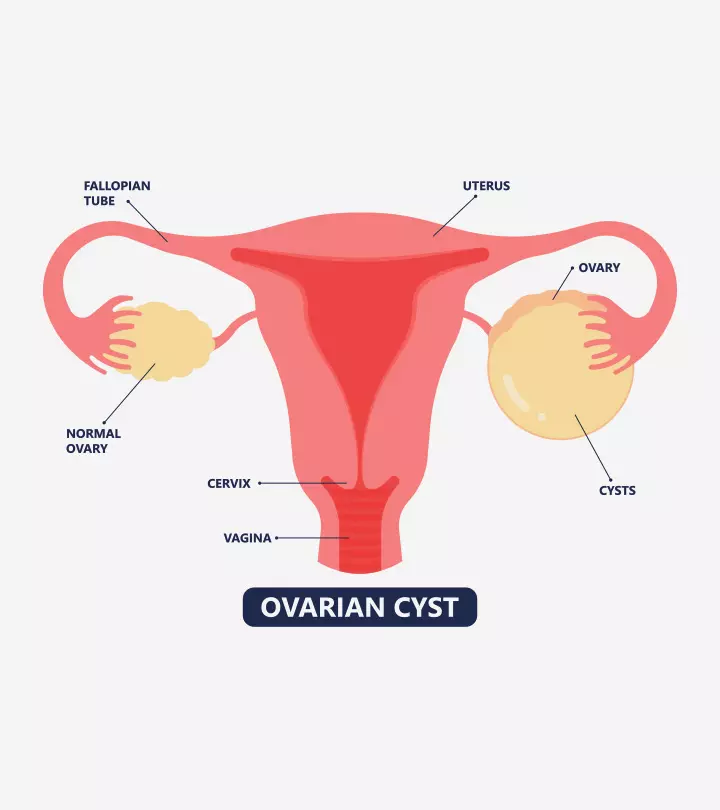
Image: Shutterstock
Pregnancy is associated with several physiological and biochemical changes in a woman’s body. One such change is cloudy urine when pregnant, which might occur for several reasons. In addition, changes in the consistency of urine might also be observed during this time. Some common reasons include bacterial or fungal infection, dehydration, or preeclampsia.

Read on to know about the causes of cloudy urine when pregnant, factors that influence it, and treatment management for underlying causes.
Key Pointers
- Cloudy urine when pregnant could occur due to substances, including white blood cells, proteins, or vaginal secretions.
- Dehydration, kidney stones, and preeclampsia are some conditions that could also make urine appear cloudy.
- Your doctor may recommend a urinalysis, blood tests, and ultrasound to diagnose cloudy urine’s precise cause.
- Following prescribed treatment is essential to avert any complications.
Causes Of Cloudy Urine During Pregnancy
The presence of substances such as white blood cells, proteins, or vaginal secretions mixed with urine may impart a cloudy appearance to it. Changes in concentrations of hormones in the urine or even some foods you eat may cause cloudy urine during pregnancy. Other conditions responsible may include the following.
1. Dehydration

The body’s water requirements increase during pregnancy. Water is also lost due to morning sickness, which usually continues up to the 14th week of pregnancy. Dehydration or inadequate fluid intake could concentrate your urine, making it darker in color, cloudy, or denser.
 Did you know?
Did you know?2. Preeclampsia

It is a condition characterized by increased blood pressure and proteinuria (protein in urine), which could be accompanied by kidney and liver problems in a pregnant woman. Other symptoms include swelling in the hands and feet, headache, nausea, or problems with vision.
It may have serious consequences such as convulsionsiA condition characterized by uncontrollable shaking of the body due to rapid muscle contraction and relaxation. and kidney or liver failure in the mother and cause preterm birthiBirth of a baby before the full 37 weeks of pregnancy. . Preeclampsia generally occurs in the second trimester (after 20 weeks) and may cause cloudy urine due to the proteins present in it or due to poor kidney function (1).
The graph below shows that preeclampsia can develop at any stage of pregnancy, especially after 33 weeks of gestation. However, the prevalence of preeclampsia has been shown to decrease by about 23% with the implementation of the FMF (Fetal Medical Foundation) screening program from the first trimester. Although these reductions did not approach statistical significance, the graph showed a reduction pattern of 38%, 34%, and 19% for early, preterm, and term preeclampsia, respectively. Additionally, there were no preeclampsia cases seen in the FMF screening group before 30 weeks of gestation.

Occurrence of preeclampsia in women by gestational weeks at birth
Source: Implementation of routine first trimester combined screening for pre-eclampsia: a clinical effectiveness study; BJOG Health fact
Health fact3. Kidney stones

Stones may be formed in kidneys (nephrolithiasis) or other parts of the renal system such as ureters or urethra (urolithiasis). They are composed mainly of calcium oxalate or phosphate and less commonly of uric acid, struvite, and cystine. Stones are rare during pregnancy but may cause complications, such as renal failure, in some cases. Besides flank pain and difficulty in urination, hematuria (blood cells in urine) may occur, causing the urine to turn cloudy (2).
4. Urinary tract infection (UTI)
The growing fetus exerts pressure on the adjacent urinary bladder, decreasing its capacity and causing a pregnant woman to urinate frequently.
Additionally, hormonal changes (progesterone relaxes smooth muscles) cause physiological changes in the urinary tract, making it prone to urinary tract infection(UTI) or bladder infections.
UTIs are mostly bacterial infections that start from the urinary tract and, if left untreated, may reach the kidneys and cause pyelonephritis (inflammation or infection in kidneys).
Cloudy urine with a strong smell or a tinge of blood may indicate UTI during pregnancy. Additionally, fever, chills, flank pain, and nausea may occur (3) (4).
5. Fungal infections

The acidic environment of the vagina changes during pregnancy, increasing the risk of yeast overgrowth. Increased vaginal discharge is common during pregnancy, but a fungal (yeast) infection may cause excess cottage cheese-like discharge with foul smell, vaginal itching, or painful urination. Urine may become cloudy if it mixes with the vaginal discharge (5).
6. Sexually transmitted diseases (STDs)
Sexually active pregnant women may also contract STDs such as chlamydiaiA sexually transmitted disease caused by bacteria and is spread through vaginal fluid and semen. , gonorrhea, and syphilis. The National Vital Statistics Reports revealed the incidence of chlamydia, gonorrhea, and syphilis among women giving birth in the United States, with rates of 1,843.9, 310.2, and 116.7 per 100,000 births, respectively. Untreated STDs could increase the risk of pregnancy complications, such as preterm birth and other fetal health issues. STDs may not cause symptoms initially, but you should look out for excess vaginal discharge, abdominal or pelvic pain, and painful urination. Urine analysis may show pyuria or the presence of white blood cells in urine (produced when the body fights infection), giving urine a cloudy appearance (6).
Diagnosis Of Reasons That Cause Cloudy Urine
Preliminary diagnosis depends on the symptoms accompanying cloudy urine in pregnant women. Inform your gynecologist about any unusual signs and symptoms suggestive of an underlying condition. It may be further diagnosed through the following procedures.
- Urine analysis refers to testing a sample of your urine for the presence of substances that would help in identifying the underlying condition. For example, UTIs and certain STIs are detected based on the type of bacteria found in urine cultures. The presence of protein may indicate preeclampsia if the woman is already hypertensive (1). The American College of Obstetrics and Gynecology recommends a urine cultureiA test to check for any bacteria or germs in the urine that can lead to a urinary tract infection. at your first prenatal visit and a re-analysis during the third trimester to rule out harmful infections (7).
- Blood tests to determine liver and kidney functions or screen for infections.
- Imaging techniques such as an ultrasound or magnetic resonance urography are performed to detect kidney stones (2).
Treatment For Cloudy Urine During Pregnancy
The treatment will depend on the underlying cause. The condition may resolve with some home remedies, or your doctor may suggest specific treatment depending on the diagnosis.
1. Stay hydrated
Proper hydration with ample water intake may solve the issue. However, you may need intravenous fluids if dehydration is severe or the water intake is impossible.
 Quick fact
Quick fact2. Get rest and frequent follow-ups
For mild cases, you may be advised to rest and reduce salt intake, but your doctor may increase the frequency of prenatal check-ups to monitor fetal development. Severe preeclampsia may require treatment with antihypertensive and anticonvulsant (anti-seizure) medications (8).
3. Include prescribed medications
Management depends on the size and location of the stones. Most of the small ones pass spontaneously in a few weeks. Your physician may advise you to increase water intake and prescribe pain medications. Make sure to avoid taking over-the-counter painkillers without consulting your doctor to prevent any potential risks to maternal health. The need for invasive treatment depends on the stage of pregnancy and complications that may arise due to larger stone size, infection, or severe pain (2).
4. Try home remedies
Mild infections may be treated with home remedies such as (9):
- Drinking more water to flush bacteria
- Cranberry as juice or in salads prevents bacteria from sticking to the walls of the urinary tract
- Probiotics such as yogurt that contain beneficial bacteria (lactobacillus) that restrict the growth of harmful bacteria

Antibiotics may be prescribed in case of persistent or severe infection.
5. Prefer topical medication for fungal infections
Topical antifungal creams or suppositories applied inside the vagina are preferred for safe prenatal care, as most oral antifungal medications are contraindicated. Consult your gynecologist before using any OTC medication (5).
6. Get an accurate diagnosis for STDs
STDs need to be accurately diagnosed, and only prescribed antibiotics should be used for treatment.
Pregnant women should always consult their healthcare provider before starting any treatment. Self-medicating, especially with over-the-counter products, can be risky for both mother and baby.
Frequently Asked Questions
1. Does cloudy urine during pregnancy determine gender?
No. Urine color in pregnancy is not an indicator of the baby’s gender. Many tests claim to predict the baby’s gender through urine tests, but they can’t be relied upon (10).
2. Is it normal to have cloudy urine during pregnancy?
It is normal to experience color changes in urine, including cloudy urine, during pregnancy. However, if you repeatedly experience cloudy or discolored urine, consult your doctor to determine if there is an underlying problem (11).
3. How can pregnant women prevent cloudy urine?
Pregnant women can prevent cloudy urine by leading a healthy lifestyle where they have access to moderate physical activity, enough hydration, and a healthy balanced diet. In case the cloudy urine is the result of an infection they should visit their healthcare provider at the earliest for treatment (11).
4. What is the color of urine in the third trimester?
Gynecologist & obstetrician Dr. Nisarg Patel says, “The color of urine in the third trimester can vary depending on factors such as hydration levels, diet, and medication taken. Generally speaking, it should still be a pale yellow or off-white color, but it could be slightly darker or have an orange tint due to further changes in hormones during this stage. It is important to seek medical advice if there are concerns about urine color during pregnancy.”
Observing cloudy urine when pregnant is common since several hormonal and physiological changes occur in the body, which may reflect in the color and texture of the urine. It is usually not a cause for concern and often clears up with better hydration or changes in diet. However, cloudy urine may also be a symptom of microbial infection, kidney stones, and UTIs. Hence, this condition is treated depending on its causative factors, and one should follow the required treatment accordingly. If your urine regularly appears discolored and cloudy, consult your doctor to rule out the possibility of any complications and safeguard your and your developing baby’s well-being.
Infographic: Is Cloudy Urine The Same As Foamy Urine?
Cloudy and foamy types of urine are cause for concern since they indicate an underlying medical condition requiring treatment. Urine is normally colorless and odorless and does not have bubbles. Go through the infographic to know the difference between cloudy and foamy urine.
Some thing wrong with infographic shortcode. please verify shortcode syntax
Illustration: Cloudy Urine When Pregnant: Causes And Home Remedies

Image: Dall·E/MomJunction Design Team
References
- Pregnancy – pre-eclampsia.
https://www.betterhealth.vic.gov.au/health/healthyliving/pregnancy-preeclampsia - ShireenMeher et al.; (2014); Renal stones in pregnancy.
https://www.ncbi.nlm.nih.gov/pmc/articles/PMC4934980/ - Urinary Tract Infections (UTIs).
https://www.acog.org/womens-health/faqs/urinary-tract-infections - Patricia J. Habak and Robert P. Griggs Jr.; (2025); Urinary Tract Infection In Pregnancy.
https://www.ncbi.nlm.nih.gov/books/NBK537047/ - Yeast Infections During Pregnancy.
https://americanpregnancy.org/healthy-pregnancy/pregnancy-complications/yeast-infections-during-pregnancy/ - Harold J. Lochner III and Nizar F. Maraqa; (2018); Sexually Transmitted Infections in Pregnant Women: Integrating Screening and Treatment into Prenatal Care.
https://idp.springer.com/authorize?response_type=cookie&client_id=springerlink&redirect_uri=https%3A%2F%2Flink.springer.com%2Farticle%2F10.1007%2Fs40272-018-0310-4 - Urinary Tract Infections During Pregnancy.
https://www.aafp.org/pubs/afp/issues/2000/0201/p713.html - WHO recommendations for prevention and treatment of pre-eclampsia and eclampsia.
https://apps.who.int/iris/bitstream/handle/10665/44703/9789241548335_eng.pdf;jsessionid=7376D825F23A1EF93B1C8A2FC52792FB?sequence=1 - Sarita Das; (2025); Natural therapeutics for urinary tract infections—a review.
https://www.ncbi.nlm.nih.gov/pmc/articles/PMC7498302/ - Gender Prediction Tests: The Latest Science.
https://americanpregnancy.org/healthy-pregnancy/pregnancy-products-tests/gender-prediction-tests-the-latest-science/ - Cloudy Urine.
https://my.clevelandclinic.org/health/symptoms/21894-cloudy-urine - Hyperemesis Gravidarum.
https://medlineplus.gov/ency/article/001499.htm#:~:text=Women%20with%20hyperemesis%20gravidarum%20have,you%20have%20a%20hydatidiform%20mole. - Low-Dose Aspirin Use During Pregnancy.
https://www.acog.org/clinical/clinical-guidance/committee-opinion/articles/2018/07/low-dose-aspirin-use-during-pregnancy - How much water should I drink during pregnancy?
https://www.acog.org/womens-health/experts-and-stories/ask-acog/how-much-water-should-i-drink-during-pregnancy
Community Experiences
Join the conversation and become a part of our nurturing community! Share your stories, experiences, and insights to connect with fellow parents.
Read full bio of Dr. Irene (Eirini) Orfanoudaki
- Dr. Nisarg Patel is a gynecologist, obstetrician, and laparoscopic surgeon from Ahmedabad, India, with over 13 years of experience in the field. He did his post graduation in Obstetrics and Gynecology from Pravara Institute of Medical Sciences, Ahmednagar, and holds a fellowship of Reproductive Medicine.
 Dr. Nisarg Patel is a gynecologist, obstetrician, and laparoscopic surgeon from Ahmedabad, India, with over 13 years of experience in the field. He did his post graduation in Obstetrics and Gynecology from Pravara Institute of Medical Sciences, Ahmednagar, and holds a fellowship of Reproductive Medicine.
Dr. Nisarg Patel is a gynecologist, obstetrician, and laparoscopic surgeon from Ahmedabad, India, with over 13 years of experience in the field. He did his post graduation in Obstetrics and Gynecology from Pravara Institute of Medical Sciences, Ahmednagar, and holds a fellowship of Reproductive Medicine.
Read full bio of Dr. Joyani Das
Read full bio of Rebecca Malachi
Read full bio of Reshmi Das
















